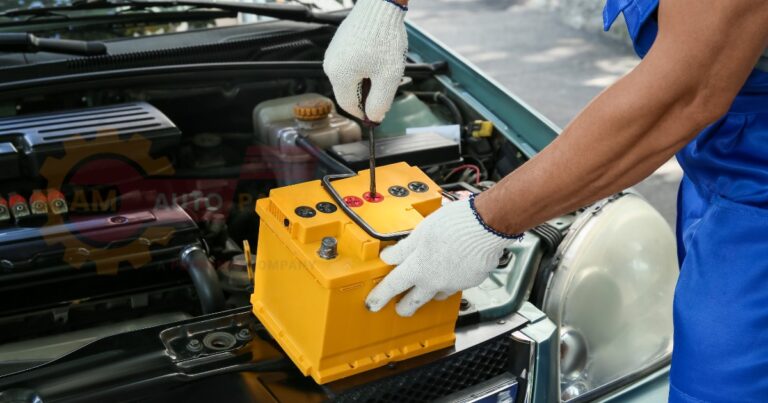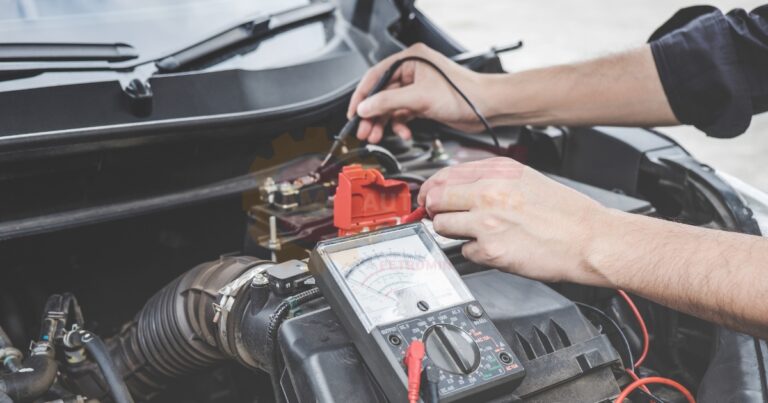How Long Car Battery Can Last: Factors Affecting Lifespan
Understanding how long a car battery can last is crucial for every vehicle owner. The lifespan of a car battery is influenced by various factors, and knowing these can help you maximize its longevity. In this article, we will explore the average car battery life expectancy, signs of a weakening battery, and tips to extend its life. We will also delve into the impact of climate, battery specifications, and the role of charging systems in battery longevity.
Car Battery Lifespan
The average lifespan of a car battery is typically between 3 to 5 years. This range can vary based on several factors, including the type of battery, driving habits, and environmental conditions. Regular maintenance and proper care can help ensure that your battery reaches the upper end of this lifespan.
- Most car batteries last 3-5 years.
- Battery type and maintenance affect longevity.
- Environmental conditions play a significant role.
Factors Influencing Battery Longevity
Several factors can influence how long a car battery can last. These include the frequency of short trips, extreme temperatures, and the overall condition of the vehicle’s charging system. Understanding these factors can help you take proactive steps to extend your battery’s life.
- Short trips can reduce battery life.
- Extreme temperatures affect battery performance.
- A well-maintained charging system is crucial.
Signs of a Weakening Car Battery
Warning Indicators to Watch For
Recognizing the signs of a weakening car battery can prevent unexpected breakdowns. Common indicators include dimming headlights, slow engine crank, and the check engine light. Paying attention to these signs can help you address battery issues before they escalate.
- Dimming headlights signal battery issues.
- Slow engine crank is a warning sign.
- Check engine light may indicate battery problems.
When to Consider Replacement
Knowing when to replace your car battery is essential for maintaining vehicle reliability. If your battery is over three years old and showing signs of weakness, it may be time to consider a replacement. Regular testing can help determine the right time for a new battery.
- Replace batteries over three years old if weak.
- Regular testing helps determine replacement timing.
- Consider replacement if frequent jump-starts are needed.
Essential Tips For Extending Your Car Battery’s Life
Proper Maintenance Techniques
Proper maintenance is key to extending your car battery’s life. This includes regular cleaning of the battery terminals, ensuring a secure fit, and checking the electrolyte levels. These simple steps can significantly enhance battery performance and longevity.
- Clean battery terminals regularly.
- Ensure battery is securely fitted.
- Check electrolyte levels periodically.
Avoiding Common Battery-Draining Habits
Certain habits can drain your car battery faster than expected. Avoid leaving lights on, using electronics when the engine is off, and making frequent short trips. Being mindful of these habits can help preserve your battery’s charge.
- Turn off lights when exiting the vehicle.
- Avoid using electronics with the engine off.
- Limit short trips to conserve battery life.
Understanding Car Battery Specifications
Cold Cranking Amps (CCA) Rating Explained
The Cold Cranking Amps (CCA) rating is a crucial specification for car batteries. It indicates the battery’s ability to start an engine in cold temperatures. A higher CCA rating is beneficial for vehicles in colder climates.
- CCA rating measures cold-starting power.
- Higher CCA is better for cold climates.
- Essential for reliable winter performance.
Battery Group Numbers and Their Importance
Battery group numbers are essential for ensuring compatibility with your vehicle. These numbers indicate the battery’s physical dimensions, terminal locations, and type. Choosing the correct group number is vital for a proper fit and function.
- Group numbers ensure battery compatibility.
- Indicate dimensions and terminal locations.
- Vital for proper battery fit and function.
Choosing the Right Replacement Battery
Matching Battery Specs to Your Vehicle
When selecting a replacement battery, it’s crucial to match the specifications to your vehicle’s requirements. This includes the correct size, CCA rating, and group number. Ensuring compatibility will provide optimal performance and longevity.
- Match battery size and CCA to vehicle needs.
- Ensure correct group number for fit.
- Compatibility ensures optimal performance.
Quality Considerations When Selecting a New Battery
Quality is a significant factor when choosing a new car battery. Opt for reputable brands and consider warranties offered. A high-quality battery can provide better performance and a longer lifespan.
- Choose reputable battery brands.
- Consider warranties for added assurance.
- Quality affects performance and lifespan.
The Role of Charging Systems in Battery Longevity
Alternator Function and Battery Health
The alternator plays a vital role in maintaining battery health. It charges the battery while the engine runs, ensuring it remains at optimal levels. A malfunctioning alternator can lead to battery drain and reduced lifespan.
- Alternator charges the battery during engine operation.
- Malfunctioning alternators cause battery drain.
- Regular checks ensure alternator health.
Identifying Charging System Issues
Identifying issues within the charging system is crucial for battery longevity. Symptoms like dimming lights and frequent battery replacements may indicate a problem. Regular inspections can help detect and resolve these issues early.
- Dimming lights may signal charging issues.
- Frequent battery replacements indicate problems.
- Regular inspections detect charging system faults.
Battery Maintenance Best Practices
Regular Testing and Inspection
Regular testing and inspection are essential for maintaining battery health. This includes checking voltage levels and inspecting for signs of wear or damage. Consistent monitoring can prevent unexpected failures.
- Test battery voltage regularly.
- Inspect for wear and damage.
- Consistent monitoring prevents failures.
Cleaning and Corrosion Prevention
Cleaning and preventing corrosion on battery terminals is vital for optimal performance. Use a mixture of baking soda and water to clean terminals and apply a protective coating. This simple maintenance can extend battery life.
- Clean terminals with baking soda and water.
- Apply protective coating to prevent corrosion.
- Simple maintenance extends battery life.
The Cost of Neglecting Your Car Battery
Potential Damage to Other Vehicle Systems
Neglecting your car battery can lead to damage in other vehicle systems. A failing battery can strain the alternator and starter, leading to costly repairs. Regular maintenance can prevent these issues.
- Failing batteries strain alternators and starters.
- Neglect leads to costly repairs.
- Regular maintenance prevents system damage.
Financial Implications of Premature Battery Failure
Premature battery failure can have significant financial implications. The cost of frequent replacements and potential towing can add up. Investing in quality batteries and maintenance can save money in the long run.
- Frequent replacements increase costs.
- Towing expenses add financial burden.
- Quality batteries and maintenance save money.
Comparing Car Battery Types: Which Lasts Longer?
Traditional Lead-Acid vs. AGM Batteries
Traditional lead-acid and AGM batteries differ in longevity and performance. AGM batteries generally last longer and offer better performance in extreme conditions. However, they are typically more expensive than lead-acid batteries.
- AGM batteries last longer than lead-acid.
- Better performance in extreme conditions.
- Higher cost compared to lead-acid batteries.
Emerging Battery Technologies for Vehicles
Emerging battery technologies are promising longer lifespans and better performance. Lithium-ion and solid-state batteries are gaining popularity for their efficiency. These technologies may become more prevalent in future vehicles.
- Lithium-ion and solid-state batteries are emerging.
- Offer longer lifespans and efficiency.
- Potential future prevalence in vehicles.
Impact of Climate on Car Battery Durability
Hot Weather Effects on Battery Life
Hot weather can significantly impact how long a car battery can last. High temperatures can cause the battery fluid to evaporate, leading to internal damage. It’s important to park in shaded areas and regularly check the battery during hot months.
- High temperatures cause battery fluid evaporation.
- Internal damage can occur in hot weather.
- Park in shaded areas to protect the battery.
Cold Weather Challenges for Batteries
Cold weather presents its own set of challenges for car batteries. Low temperatures can reduce the battery’s ability to hold a charge and increase the strain on the engine. Ensuring your battery is fully charged and in good condition is crucial during winter. Automotive Power Source is what makes cars move It can be gasoline electricity or other types of fuel Battery health percentage
Automotive electrical measurement helps check if car parts that use electricity are working right It uses special tools to test things like batteries wires and lights in vehicles Jumpstart dead battery is a quick way to get your car running again when the battery is out of power You can use special cables to connect your car’s dead battery to another car’s working battery to bring it back to life
Automotive Power Depletion happens when a car’s battery loses energy over time This can make it hard for the car to start or run its electrical systems properly Automotive energy solutions help cars and trucks use different types of power to run These solutions include electric batteries hydrogen fuel cells and more efficient engines for vehicles
- Cold weather reduces battery charge capacity.
- Engine strain increases in low temperatures.
- Keep the battery fully charged in winter.
Eco-Friendly Battery Disposal and Recycling
Proper Disposal Methods
Proper disposal of car batteries is crucial for environmental protection. Batteries contain harmful chemicals that can leach into the soil. Always dispose of batteries at designated recycling centers.
- Dispose of batteries at recycling centers.
- Prevent harmful chemical leaching.
- Protect the environment with proper disposal.
Battery Recycling Programs and Benefits
Participating in battery recycling programs offers numerous benefits. Recycling helps recover valuable materials and reduces environmental impact. Many programs offer incentives for returning used batteries.
- Recycling recovers valuable materials.
- Reduces environmental impact.
- Incentives available for battery returns.
Understanding how long a car battery can last and the factors affecting its lifespan is essential for every vehicle owner. By following the tips and insights provided, you can ensure your car battery remains reliable and efficient for years to come.
Frequently Asked Questions (FAQs)
Can a Car Battery Last 10 Years?
While it’s uncommon, some car batteries can last up to 10 years with proper care. Factors such as climate, driving habits, and maintenance play a significant role. Regular testing and maintenance can help achieve this extended lifespan.
How Often Should You Replace Your Car Battery?
Car batteries should generally be replaced every 3 to 5 years. However, the exact timing can vary based on usage and environmental conditions. Regular testing and monitoring of battery performance can help determine the optimal replacement time.
What Kills a Car Battery Fastest?
Leaving lights on and using electronics with the engine off are common culprits. Extreme temperatures and infrequent use can also drain a battery quickly. Being mindful of these factors can help preserve battery life.






